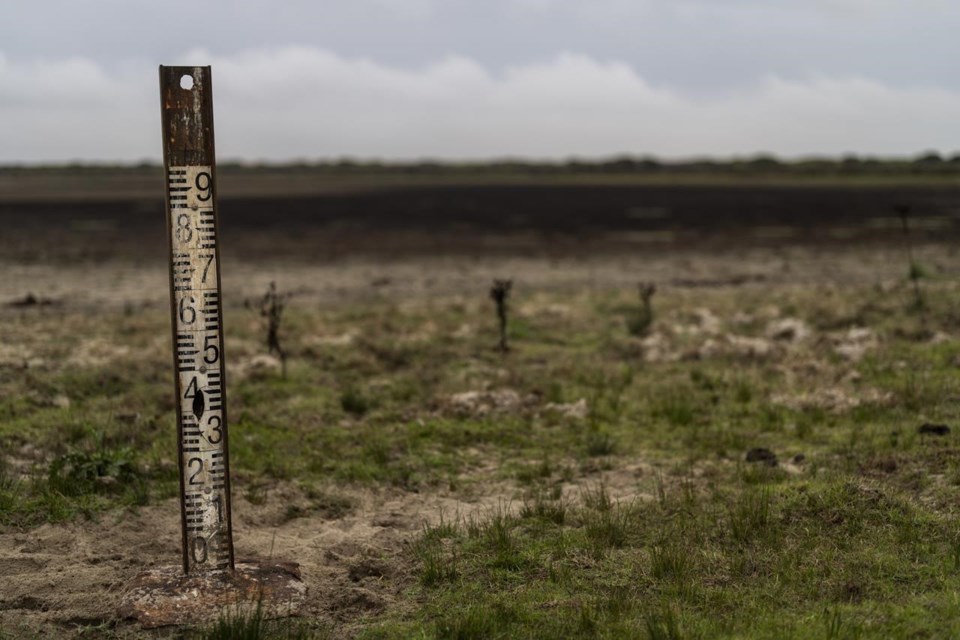BARCELONA, Spain (AP) — A controversial plan to increase irrigation in an area adjoining one of won initial approval Wednesday from lawmakers in southern Spain's Andalusia region.
The proposal to rezone the land goes against the advice of ecologists and repeated warnings from Spain's central government and European Union officials. They say the Doñana nature reserve is drying up under pressure from farming, tourism and a prolonged drought made worse by climate change.
As expected, the regional parliament voted in favor of considering the bill, which was sponsored by the conservative Popular Party that rules Andalusia and had the support of the far-right Vox party.
If the measure becomes law, 1,000 to 1,500 hectares (2,470-3,700 acres) of land near the Doñana reserve would be declared irrigable. The bill's critics say the zoning change would in effect grant an amnesty to the many farms that already use illegal wells to tap into the aquifer underlying the wetlands to grow strawberries for export across Europe.
The Popular Party says its intention is to help farmers who are in a legal limbo regularize their livelihoods, and the party pledged the plan would not hurt the wetlands.
Andalusia government spokesperson Ramón Fernández-Pacheco said the regional administration was committed to protecting Doñana and that a provision of the proposed bill calls for individually analyzing the claims of farmers who might be eligible to receive surface water.
“I am worried that the EU is receiving a distorted image of what the bill says,” Fernández-Pacheco said.
Ecologists and opposition parties, however, accused the Popular Party of promising surface water that it cannot provide in an attempt to win votes ahead of local elections on May 28. The bill could be pushed through before the elections, although that is not guaranteed.
Spain's central authorities and plan to reroute water from another river system. That water, however, the Madrid government says is meant to replace well water already legally tapped, not increase irrigation.
Florika Fink-Hooijer, the head of the EU’s Directorate General for the Environment, told Spain’s government last month that . In 2021, the European Court of Justice condemned Spain for neglecting the Doñana wetlands. Further neglect of the nature reserve could result in a hefty fine for Spain.
Scientists who work in Doñana agree that the plan would only increase the strain on the aquifer.
“This vote should not even take place,” Eloy Revilla, director of the Doñana Biological Station of the Spanish National Research Council, told The Associated Press by phone.
Revilla said it would send the wrong message: that those who use illegal wells could get away with it.
“It will not solve the problems of Doñana or the farmers. It will only further complicate a situation that is already complex,” he said.
Other farmers who use legal wells on already irrigable land are also against the move, fearing it will damage the reputation of the berries that they market as being grown near the pristine conditions of Doñana.
The Doñana reserve covers 74,000 hectares (182,000 acres) on an estuary where the Guadalquivir River meets the Atlantic Ocean on Spain’s southern coast. It is a wintering site for half a million waterfowl and a stopover spot for millions more birds that migrate from Africa to northern Europe. It is also home to five threatened bird species, including the endangered Spanish imperial eagle.
It has also become a major agricultural center for farmers who in previous decades shifted over from low-water crops like olives and grains to water-thirsty berries to boost revenues.
The farmers who demand water rights are owners of lands that were deemed non-irrigable when in 2004 an agreement was struck between the authorities, ecologists and farmers to manage farming activity around the reserve.
Since then, the berry boom led to an estimated 1,000-2,000 illegal wells popping up near the reserve, according to studies carried out by environmental group WWF.
An almost identical bill was presented by the Popular Party last year, but did not make it to a final vote due to a snap election in the region.
“For the first time, after such a long fight, we have hope that we can resolve our problems after so many years,” said Romualdo Macías, president of the platform that represents some 1,500 farmers pushing for the new plan. “Doñana cannot be a park with a wall around it and everything on this side left to be a desert.”
The renewed initiative comes with Spain suffering a record drought in some areas after .
Revilla, the biologist, said that the situation is “critical” for the lagoons and marshes that make Doñana a UNESCO World Heritage Site and Biosphere Reserve.
“The ecosystems in Doñana that depend on subterranean water are in critical condition,” he said. “And it will only get worse if we consider that last year was very dry and this year promises to be drier still.”
___
Follow AP’s climate coverage at
Joseph Wilson, The Associated Press




